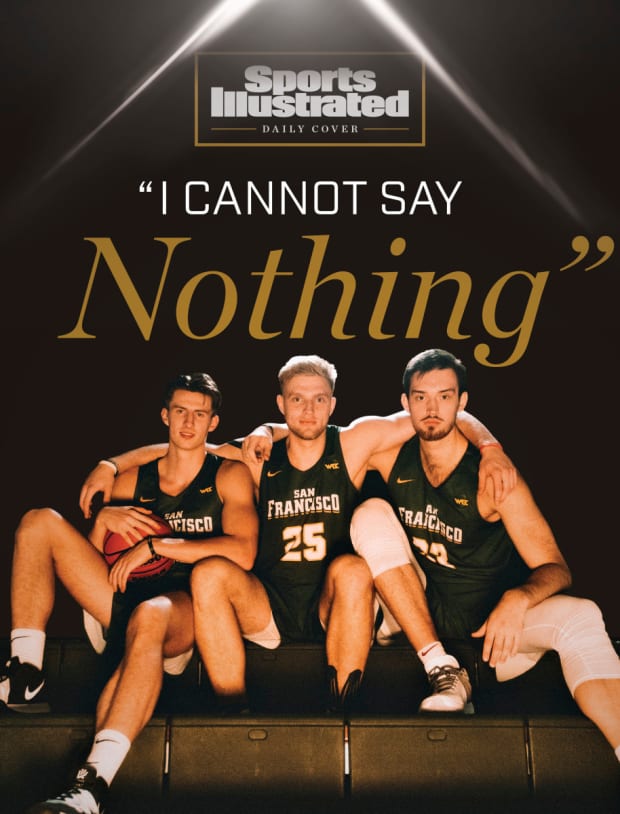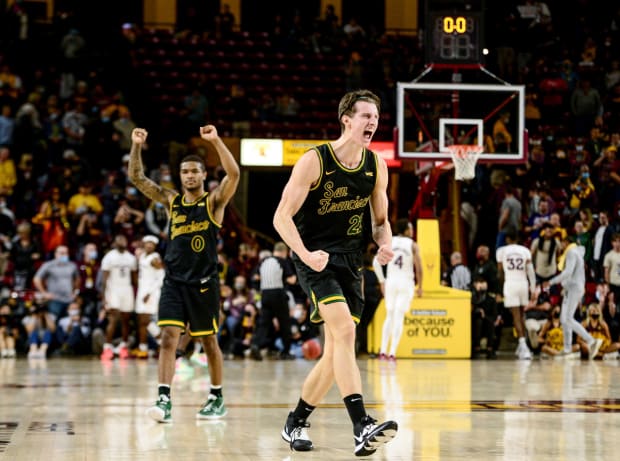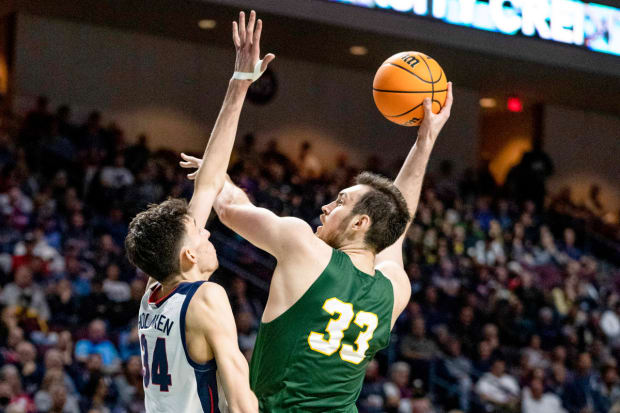On March 4, one night before the San Francisco men’s basketball team celebrated a 75–63 win over BYU that all but clinched its first NCAA tournament bid since 1998, three Dons players posted the same video to each of their social media accounts.
The clip opened on a solo shot of sophomore center Volodymyr Markovetskyy, his 7'2" frame folded into the front row of USF’s film room, the blue-and-yellow flag of his country draped over the seats behind him. Gaze fixed on the camera, hands clasped in his lap, the 21-year-old began by introducing himself: “Hello, my name is Volodymyr, and I’m from Ukraine.” Then he recounted what happened when he phoned his family there in the early hours after Russia launched its invasion in late February: “The first thing I heard was my mom crying.”
The video faded out next, giving way to title cards explaining how Markovetskyy’s mother and sister had since fled Ukraine, and how his father, a police officer, had stayed behind to help “protect their home.” When it returned, Markovetskyy was no longer alone: Flanking him like bodyguards were a pair of 6'9" forwards from Belarus, Yauhen Massalski and Dzmitry Ryuny, both of whom joined their teammate in reading a prepared plea for peace. “Please hear us,” Massalski said before the trio declared together: “Stop the war.”

Angel Franco
The result was a striking display of solidarity bridging the conflict’s battle lines: two Belarusians wrapping their arms around the broad shoulders of their Ukrainian brother, decrying a conflict in which their country is aiding and abetting the Russian attack on his. The whole video lasted just 64 seconds, but it contained a week’s worth of emotion for three young men who, as Ryuny put it in the video, would’ve rather been worrying about final exams and postseason play instead of wondering whether they’d ever see their loved ones again.
“The main point was showing we are from countries that are opposed, but we’re not hating each other,” Ryuny says today. “That we’re standing united, and don’t let the war separate us.”
The video hasn’t gone viral by any stretch; as of Tuesday they had clocked about 4,500 total views on Twitter and Instagram. But while they hope their platform around USF’s first-round March Madness matchup against Murray State on Thursday will help boost that count, the reaction to their message ultimately matters far less than what it meant for them to speak it.
“I feel like a lot of Ukrainian people, and Belarus and Russian people, we can stay together,” Markovetskyy says. “Because really, in this moment, we can’t do much. Everything we can do is just talk about this situation so people understand what’s happening in my home right now.”

Joe Camporeale/USA TODAY Sports
For Markovetskyy, home is the city of Ivano-Frankivsk, eight hours west of the capital, Kyiv, and three east of Poland. The area is mainly known as a home to several bustling ski resorts, though Markovetskyy, who left in 2019 to play at Washington State before transferring to USF this season, prefers its less touristy corners. “A very beautiful town,” he says. “The best place in the world to go and chill.”
That image was shattered three weeks ago when Markovetskyy reached his tearful mother, Lesya Markovetska, and learned that Russian soldiers had stormed into Ukraine on several fronts, including through Belarus to the north, and that the Ivano-Frankivsk airport had been hit by an airstrike. “It was actually so scary,” Markovetskyy recalls. “You don’t know what [will] happen tomorrow, what they will do.”
Less than 24 hours after the assault began, the Dons hosted No. 1 Gonzaga for their regular-season home finale. Sprinting into the locker room after warmups, Markovetskyy found a message on his phone and heaved a sigh of relief: His mother and his younger sister, Julia, had successfully escaped across the Polish border, and were headed for asylum at a friend’s apartment in Lithuania. But the comfort was fleeting.
“I remember sitting on the bench, everyone yelling because [it was] this big day, Senior Night against Gonzaga, and I feel nothing.” says Markovetskyy, who played just two minutes and recorded no other stats in a 89–73 loss, “Mentally, emotionally, I was broke.”
For the next few days, Markovetskyy found it difficult to look away from the devastation. He thought about friends and family still living in Kyiv, where wailing sirens and exploding mortars now form the soundtrack of a city under steady siege. “I can’t even imagine if my family were living in Kyiv right now,” he says. “I probably would stop doing basketball, stop doing school and go home.” He thought about his father, who continues to grab an AK-47 every morning and walk the streets of Ivano-Frankivsk on safety patrols. “I try to watch all the news: TV, Instagram, Telegram, everything,” he says. “My girlfriend tell me, ‘Just put your phone away and relax.’”
Eventually, though, a few things lifted the big guy up. One was the eventual word that his mother and sister were safe in Lithuania and that they had begun the process of applying for U.S. visas. Another was getting to talk daily to his dad, also Volodymyr, who won’t have to take up arms on the front lines barring a “worst-case scenario,” Markovetskyy says. “He tell me he’s doing good, he’s O.K., the situation in my city is O.K. It’s helped me.”
Then there was the support of the USF community: coaches, teammates, even fellow students stopping him on campus to let him know they’re thinking about him and his family. “Huge,” he says. “Incredible.” Despite the little boosts of strength that these loving interactions gave him, though, he was still left with a sense of powerlessness against the forces fueling a war—one that had killed nearly 700 civilians as of Tuesday, according to the UN, and produced 3 million more refugees—on the other side of the planet. “I don’t know what to do,” Markovetskyy says. I want to help somehow. Then I realize that I want to talk. I want to talk about this situation.”
As it happened, his two closest friends on the team had reached the same conclusion.

Kyle Terada/USA TODAY Sports
By his own admission, Markovetskyy knew “nothing” about USF before he visited campus for a practice after entering the transfer portal last summer. But he felt an instant feeling of comfort upon finding a pair of familiar faces on the court: Ryuny, a 22-year-old junior with whom he had crossed paths at a prospect camp in Europe, and Massalski, also 22, a graduate transfer from San Diego and a former opponent of Markovetskyy’s in a second-tier Lithuanian league.
“I saw these two guys from Belarus,” Markovetskyy says, “and I realize: The world is so small.”
The trio bonded quickly. They ate together at every team meal, yakking away in Russian about their families and home lives. (Massalski and Ryuny, themselves former members of the same Minsk-area youth sporting school, are native speakers; Markovetskyy learned it in high school.) They trekked off campus to a Russian grocery, grabbing ingredients for a New Year’s Day feast of Olivier potato salad and other traditional dishes. “[To have] two guys from the same area, with the same culture, it’s cool,” Markovetskyy says, “because you feel like they understand you.”
With none of them having blood relatives Stateside, all having come over alone to chase their basketball dreams, the friendships offered a welcome taste of their distant Eastern European homes. There are just seven current Ukrainian players in Division I men’s basketball, according to CBS Sports. Massalski and Ryuny are the lone Belarusians, and only a handful more hail from other countries that were part of the former Soviet Union. That Vova, Dima (Ryuny’s nickname) and Squirrel (Massalski’s) wound up sharing the same locker room is nothing short of serendipitous to them.
“It’s a very unique, amazing experience,” Massalski says. “Imagine you move to a place far, far away, and there are two other people at your office who are basically from the same street as you. They know the jokes that only you might know, they eat the food that only you might like.”
“We always check in on each other,” Ryuny adds. “We always keep each other straight.”
This was especially true in the hours before Senior Night against Gonzaga, as Markovetskyy’s mother and sister were on the run, when Ryuny wrapped him in a hug and whispered, “I got you, bro. I’m here for you.” And it was what inspired Massalski several days later to approach Markovetskyy with the idea to film a video together. “Because he felt not in place, and because his heart was crying, so was ours at the same time,” Massalski says. “I was like, ‘There’s no freakin’ way I will let him eat himself from the inside. How can I help?’”

In theory, supporting Markovetskyy however possible was a no-brainer to Massalski and Ryuny. In practice, however, speaking out proved more complex. Massalski learned as much before he wrote an August 2020 op-ed for the San Diego athletes website calling attention to a violent countrywide crackdown on political dissent and other forms of free speech in Belarus, and resigned himself to never returning out of fear that he would be arrested.
“For me and Dima, it's a risk,” Massalski says. “We had to make a separate decision on this. I had to call my mom and dad and be like, ‘I cannot say nothing.’ And they looked at me and said, ‘We understand that this is a goodbye,’ because they cannot leave and I cannot go there. But my mom also said I was doing the right thing. After that, it wasn’t even another thought.”
Like Massalski, Ryuny doesn’t expect to go back to Belarus for the foreseeable future, having gotten enough of a shock while spending two months there in summer 2021 and hearing from friends who had witnessed protestors chucked into the backs of police vans. “That s--- is not safe at all,” Ryuny says. Of course that didn’t make the conversation with his parents any less difficult, explaining that they might not see each other anytime soon. But Ryuny also had deep personal motivation to make his voice heard: Numerous relatives on his dad’s side still live in Ukraine.
“They’re not in the epicenter, so they’re kind of safe,” Ryuny says. “But they have trouble getting groceries, trouble getting medicine. They’re definitely not in the best situation.”
The trio filmed their statement on the first day of March, between the end of the regular season and the West Coast Conference tournament; Massalski, fresh off leading the WCC with 13 double doubles and earning first-team all-conference honors, asked a team videographer to film it and edited the raw footage himself. An alternate, five-minute version contained a clip of a missile hitting the Ivano-Frankivsk airport, along with video messages from Markovetskyy’s mother and sister. But the players agreed briefer was better.
“We understood that there’s only one shot at this thing,” Massalski says. “You want to get the message across, make it strong.” So Massalski called for a cease-fire. Ryuny begged for innocent people to stop dying. Markovetskyy expressed hope that he could hug his dad again.
They know that words alone will not stop what is shaping up to be the biggest armed conflict in Europe since World War II. But sharing them has nonetheless given them comfort that they have done all they can. “It’s helped me a lot,” Markovetskyy says. “This reality, only thing I can do [is to] just talk.” As a result he reports being less glued to his phone lately, placing daily checkup calls to his father, and to his mother and sister, but otherwise consuming little content. And it was an enormous emotional boost to recently learn that his mom and sister had been approved for their U.S. visas.
“I hope they come soon,” he says. “The first thing I’ll show them, for sure, is the Golden Gate Bridge. Then go to the park, then to a lot of awesome restaurants.”
Knowing the potential fates that would await Squirrel and Dima if they ever went back to their homes, Vova is holding out hope that he can eventually show them around his. Maybe they can head to a ski resort and feel the freedom of zipping down a snowy mountain together. Or maybe they will just go and chill.







